Salary Poland 2025 Report: Salaries in Poland Hit New Highs
Salary Poland 2025 Report is a comprehensive guide for employers, HR professionals, policymakers, and job seekers seeking to understand the current salaries in Poland.This report delivers up-to-date insights into salary levels in Poland, employment trends, and the key drivers shaping the Polish labor market. Whether you’re planning a recruitment strategy or evaluating a career move, this report offers the critical data you need.Why Read the Salary Poland 2025 Report ?
- A clear overview of average salaries in Poland by sector and region
- Key recruitment trends observed in 2024
- Market forecasts for 2025
- Salary ranges (min–median–max) across major industries
Poland Wages in 2025: What’s Driving the Change?
The Polish job market has continued to evolve rapidly, shaped by economic growth, digital transformation, and workforce mobility. Our analysis identifies:- High-demand roles and skill shortages
- Shifts in employer expectations
- Employee preferences and motivations
Our Methodology: How the Salary Report Was Built
Salary Report Poland 2025 is grounded in real-world data gathered throughout 2024 using two primary sources:1. Recruitment Project Data
- Real-time salary figures from active hiring processes
- Industry-specific benchmarks collected through our daily work with clients
2. Targeted Sector Surveys
- Insights from professionals and hiring managers across Poland
- Data on market expectations, compensation trends, and benefits
Understanding Salary Brackets (PLN Gross)
To help interpret the data effectively, each salary range in the report includes:Minimum (Min)
The lowest reported salary. Often reflects entry-level or less competitive offers.Median
The middle value: 50% earn less, 50% earn more. Offers a realistic benchmark unaffected by outliers.Maximum (Max)
The highest reported salary. Typically linked to senior or niche expert roles.These categories provide a clear picture of salary potential across positions in Poland.Optimistic Compensation Outlook
Average Gross Monthly Salary in Poland (May 2025)
According to the Central Statistical Office (GUS) and the Social Insurance Institution (ZUS), the average gross monthly salary in Poland in the enterprise sector (companies with 10+ employees) reached:- 8,670 PLN gross (approx. 2,050 EUR) in May 2025
- Reflects a 10% year-on-year increase
- Higher salaries observed in large cities and key industries
The Minor Role of Collective Agreements
Poland lacks nationwide, binding collective agreements:- Only 17% of employment relationships are covered by such contracts
- Wages are typically negotiated individually between employers and employees
Minimum Wage in Poland (2025)
- 4,666 PLN gross monthly (approx. 1,106 EUR)
- 30.50 PLN gross hourly (approx. 7.2 EUR)
The Polish Job Market in 2025: Trends and Outlook
Key Trends
- Strong demand for skilled professionals in engineering, logistics, and renewable energy
- Impact of automation on manufacturing and retail employment models
- Growth in remote and hybrid work models
- Expansion of sustainability and green jobs across sectors
Game-Changing Factors Shaping Wages and Employment
1. Economic Growth
- Hiring expansion in manufacturing, logistics, and finance
2. Digital Transformation
- Data analysis
- Cloud computing
- Cybersecurity
3. Geopolitical Climate
- Increased trade and supply chain expansion
4. Automation & AI
- AI in HR, IT, marketing
- Automation in logistics and manufacturing
5. Aging Workforce
- Upskilling mid-career workers
- Mentoring and talent entry programs
Conclusion: A Dynamic Labor Market Ahead
In 2025, the Polish job market remains resilient and full of potential. Companies ready to adapt will benefit from:- Emerging technologies
- Access to global talent
- Stable economic growth
The Polish Job Market in 2025: Competitive and Evolving
The Polish job market in 2025 remains competitive and dynamic, offering attractive opportunities for both skilled professionals and forward-thinking employers.Key Factors Reshaping the Polish Job Market
1. Economic Growth
- Growth in manufacturing, logistics, and finance
2. Digital Transformation
- Data analysts
- Cloud experts
- Cybersecurity specialists
3. Geopolitical Positioning
- Job creation in logistics, engineering
- Cross-border cooperation
4. Automation and AI
- Roles in IT, marketing, customer service
5. Aging Workforce
- Upskilling and mentorship programs
Shift in Employment Types: Full-Time, Part-Time, Freelance
- Full-Time: dominant in industry, logistics, engineering
- Part-Time: growing in retail and customer service
- Freelance: booming in IT, digital, creative services
Sector Focus: Legal Job Market Trends in Poland 2025
Compliance and Regulatory Affairs
- Financial services compliance
- Risk management
Intellectual Property
- Patent filings
- IP litigation
Data Privacy & Cybersecurity
- GDPR audits
- Breach response
Anti-Money Laundering (AML)
- Regulatory reporting
Environmental Law & ESG
- Sustainability policy compliance
Conclusion: Aligning with Market Shifts
The Polish job market in 2025 is shaped by technological innovation, demographic change, and regulatory evolution. Businesses and professionals who stay informed and agile will be best positioned to take advantage of emerging opportunities.Get in touch with Target Solutions Poland to access detailed salary insights or explore how your organization can stay ahead in a rapidly changing employment landscape.
Prestigious Salary Tiers for Legal Experts

HR Trends in Poland 2025: Well-Being, Inclusion & Innovation
Employee Well-Being: A Core Focus
As companies prioritize mental health and work-life balance, HR departments are implementing structured programs to support employee well-being. Key initiatives include:- Wellness programs promoting physical and mental health
- Mental health services such as counseling and stress management workshops
- Flexible working hours to attract and retain top talent
Diversity and Inclusion: Building Inclusive Workplaces
Organizations increasingly value diverse and inclusive environments. Recruitment and retention strategies are evolving to reflect this focus.- Diversity training for team leaders and managers
- Equitable hiring processes
- Support systems for underrepresented groups
Remote Work Management: Adapting to New Norms
The rise of hybrid and remote work models requires strategic adaptation in HR practices.Onboarding and Engagement
- Creating virtual onboarding experiences
- Maintaining team engagement remotely
Performance Tracking
- Tools for measuring productivity without micromanagement
- Balancing accountability with employee autonomy
Remote Leadership
- Training managers in virtual team leadership
- Fostering trust and communication across locations
Upskilling and Technology Integration
HR teams must stay ahead of digital transformation and reskilling needs.- Developing upskilling programs to meet changing market demands
- Implementing digital platforms to automate HR operations
HR Analytics: Data-Driven Decision-Making
Data is becoming central to strategic HR functions.- Analyzing turnover, performance, and engagement trends
- Using insights to guide workforce planning and retention strategies
Digital Tools and Platforms
Modern HR operations rely on software and AI to drive efficiency and reach.- HRIS platforms for data centralization
- Payroll automation tools
- AI-powered recruitment systems and chatbots
Learning and Development Expertise
Learning & Development (L&D) professionals are in high demand to support upskilling goals.- Creating engaging training programs and courses
- Using e-learning and LMS platforms
- Applying gamification for higher participation
Soft Skills and Strategic Thinking
HR professionals must combine technical skills with strong interpersonal capabilities to navigate modern challenges.- Strategic planning and leadership
- Effective communication and conflict resolution
- Problem-solving and adaptability
HR Pay Trends – Competitive Salaries & Career Advancement
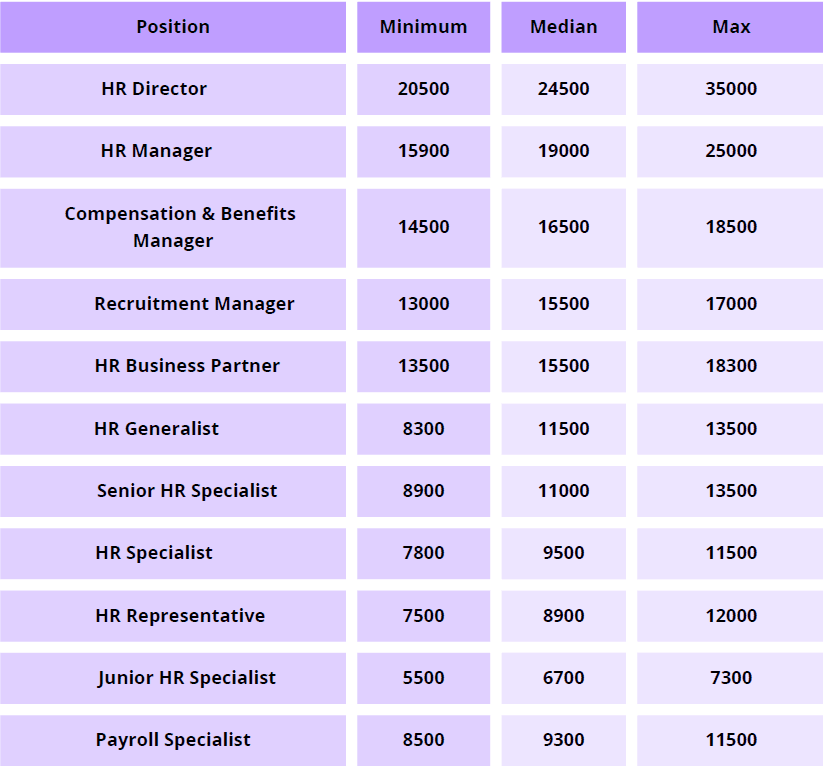
Engineering Hotspots: Where Demand and Innovation Are Growing
Engineering Sector Growth in Poland: Salary Report Poland 2025
In 2025, engineering continues to play a vital role in Poland’s economy. According to the Salary Report Poland 2025, this sector is contributing significantly to rising wages in Poland and remains a strong driver of demand for qualified professionals.Growth Areas in the Engineering Sector
Renewable Energy
The transition to renewable energy is boosting salaries in Poland for engineers involved in solar, wind, and energy storage technologies.- Ongoing projects include large-scale solar farms, offshore wind turbines, and grid-level battery systems.
- Engineering roles cover the design, construction, and maintenance of this infrastructure.
Construction and Infrastructure
Urban development and national infrastructure investment are pushing demand for civil and structural engineers. These roles are directly reflected in the upward trend of average pay in Poland within technical sectors.- Engineers are working on roads, bridges, tunnels, and sustainable housing projects.
- Smart city initiatives are fueling demand for sustainable design and green building skills.
Technology-Driven Engineering
Technology-driven industries such as automotive and aerospace are reshaping salaries in Poland for engineers with advanced digital skills.- Key areas include AI, IoT, robotics, and smart manufacturing.
- Cross-industry cooperation between IT and engineering drives up average salary Poland benchmarks for technical roles.
Most In-Demand Engineering Specializations
The following engineering fields show the strongest influence on rising Poland wages in 2025.Energy and Environmental Engineering
- Experts in energy efficiency, renewables, and sustainability are earning well above the average salary Poland benchmark.
- Roles such as energy auditors and project engineers are listed among top-paying categories in the Salary Report Poland 2025.
Civil and Structural Engineering
- Urban infrastructure projects are offering attractive salaries in Poland for structural and municipal engineers.
- Experience in green construction adds further value to base compensation levels.
Mechanical Engineering
- Manufacturing and automotive firms are offering competitive Poland wages to engineers in design, R&D, and robotics.
- The Salary Report Poland 2025 indicates strong demand for maintenance and process engineers across industrial sectors.
Electrical and Electronics Engineering
- Electrical engineers working on power systems, embedded technologies, and smart grids are contributing to the growth of average pay Poland.
- These roles are especially prominent in consumer electronics and energy technology companies.
Software and Systems Engineering
- Control systems, AI, and automation engineers are leading the shift in salary Poland indicators within the engineering workforce.
- Systems integration and industrial automation roles command above-average wages.
Summary: Engineering Sector Insights 2025
The Salary Report Poland 2025 clearly shows that engineering careers are driving up both wages in Poland and overall compensation expectations.Key takeaways:- Engineering professionals are achieving higher-than-average salary Poland benchmarks across industries.
- Upskilling in sustainability, AI, and automation strengthens earning potential and boosts salaries in Poland over time.
- Technical innovation remains a powerful engine behind the rise in Poland wages in 2025.
Navigating Pay Evolution in Engineering – Salary Report Poland 2025
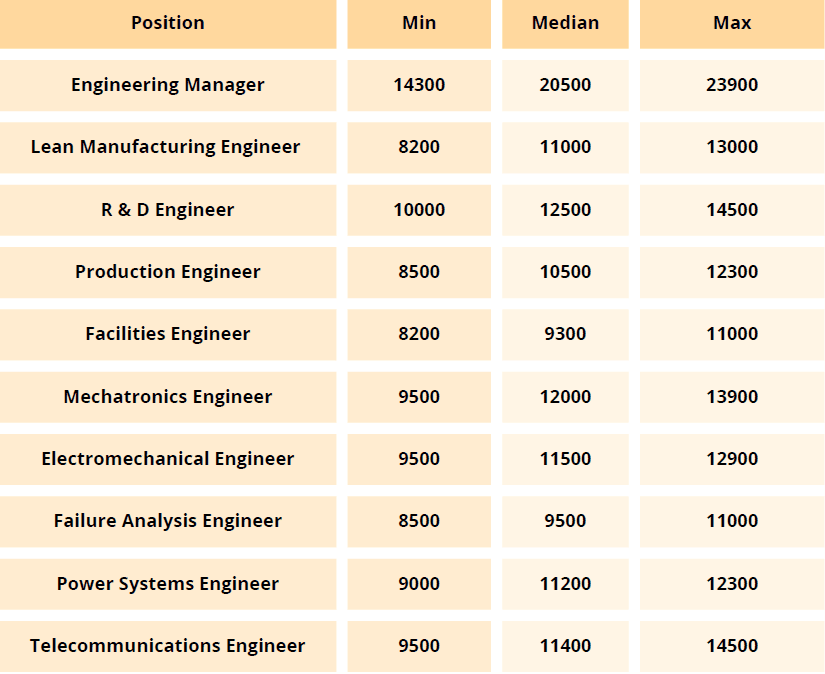
Manufacturing 4.0 in Poland: The Future Is Now
Industry 4.0 and Workforce Transformation: Salary Report Poland 2025
In 2025, Poland’s manufacturing sector is undergoing rapid transformation through Industry 4.0 technologies. Automation, robotics, and digital systems are reshaping how products are designed, assembled, and delivered. These changes are also having a direct impact on wages in Poland for manufacturing professionals.Changing Workforce Needs in Manufacturing
The rise of automation is reducing demand for low-skill roles and increasing the need for technical expertise.- High demand for skilled technicians and engineers capable of operating and maintaining automated machinery.
- Decline in repetitive labor roles due to robotic assembly, packaging, and inspection processes.
- Growth in digital roles such as production data analysts and automation programmers.
Upskilling and Reskilling for Industry 4.0
To stay competitive, manufacturers are investing in staff development through technical training programs.- Skills in mechatronics, PLC programming, and IoT integration are in highest demand.
- Reskilling is crucial for employees transitioning from traditional roles to automated environments.
Human–Machine Collaboration in Production
The growing use of cobots — collaborative robots — is redefining human roles in production lines.- Workers must now interact with and supervise automated systems.
- Companies seek employees skilled in cobot programming and diagnostics.
Top Manufacturing Regions in Poland
- Śląskie (Silesia): Leading automotive and heavy industry zone, offering some of the highest manufacturing salaries in Poland.
- Mazowieckie (Mazovia): Electronics, pharmaceuticals, and food processing dominate, with competitive average pay in Poland.
- Dolnośląskie (Lower Silesia): Aerospace and renewable energy components are fueling salary growth in the southwest.
- Wielkopolskie (Greater Poland): Strong in agri-food and machinery production.
- Pomorskie (Pomerania): Shipbuilding and offshore energy manufacturing drive employment in coastal cities.
Outlook: Industry 4.0 and Economic Impact
The adoption of Industry 4.0 technologies is helping Poland remain globally competitive in the manufacturing sector.- Bridging technical skill gaps is essential for long-term productivity.
- Urban industrial zones continue to offer higher-than-average salary Poland across production and engineering roles.
- Growth in automation, data, and digital workflows creates new opportunities and higher salaries in Poland for tech-savvy professionals.
Salary Report Poland 2025 – Wage Structure Manufacturing
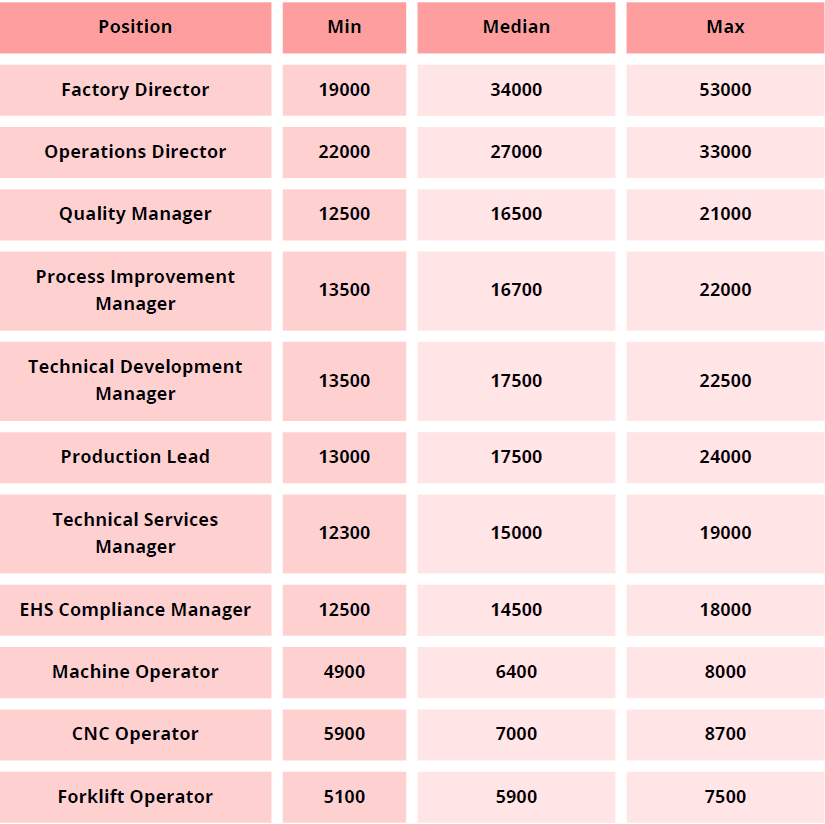
Digital Marketing, Content & Analytics: Key Drivers in 2025
Sector Overview: Salary Report Poland 2025
According to the Salary Report Poland 2025, the marketing sector in Poland is experiencing rapid digital transformation. As businesses adjust to new consumer behaviors and technologies, demand is rising for professionals with digital, analytical, and creative skills — all influencing salaries in Poland within this competitive field.Key Trends in the Marketing Sector
Digital Marketing
Marketing departments are prioritizing digital-first strategies, focusing on paid media, SEO, social platforms, and email automation.- PPC Specialists: High demand for experts who can optimize ad spend and improve ROI.
- Social Media Strategy: Brands are increasing investment in content and community engagement.
Content Creation
Content marketing continues to grow as brands compete for attention and search visibility.- SEO-Optimized Content: Critical for organic traffic and ranking performance.
- Cross-Channel Storytelling: Skills in video, blogs, and podcasts are in high demand.
Marketing Analytics
Data-driven roles are becoming central to strategic decision-making in marketing teams.- Tools like Google Analytics, Looker, and CRM dashboards are now essential.
- Analysts guide campaign optimization and budget allocation.
AI in Marketing: A Game Changer
AI is reshaping how campaigns are designed, delivered, and analyzed — with clear impact on average pay in Poland for marketing professionals.Marketing Automation
- Platforms like HubSpot, Marketo, and Salesforce are automating routine tasks and improving personalization.
- Specialists in these tools are in high demand and benefit from higher salaries in Poland.
AI Analytics and Forecasting
- AI tools predict behavior, segment audiences, and optimize performance.
- Experts in predictive analytics are seeing higher-than-average salary Poland rates.
Content Generation with AI
- Platforms like ChatGPT and Jasper are being used to draft, edit, and optimize marketing content.
- Marketers who can combine AI tools with creative skills are gaining a competitive advantage in both delivery and wages in Poland.
Programmatic Advertising
- Real-time bidding and AI-powered targeting are streamlining ad spend.
- Programmatic specialists are reporting rising Poland wages across digital agencies and in-house teams.
Summary: Marketing Sector Outlook 2025
The Polish marketing landscape in 2025 is dynamic and heavily tech-enabled. Professionals who blend strategy, creativity, and digital tools are well-positioned for growth.Key insights from the Salary Report Poland 2025:- Rising salaries in Poland for roles in content, automation, analytics, and performance marketing.
- AI adoption is creating new roles and raising average salary Poland expectations for digital marketers.
- Cross-functional skills (creative + analytical) offer the strongest salary Poland potential.
Marketing Pay Scale Report – Who’s Earning the Most? – Salary Report Poland 2025
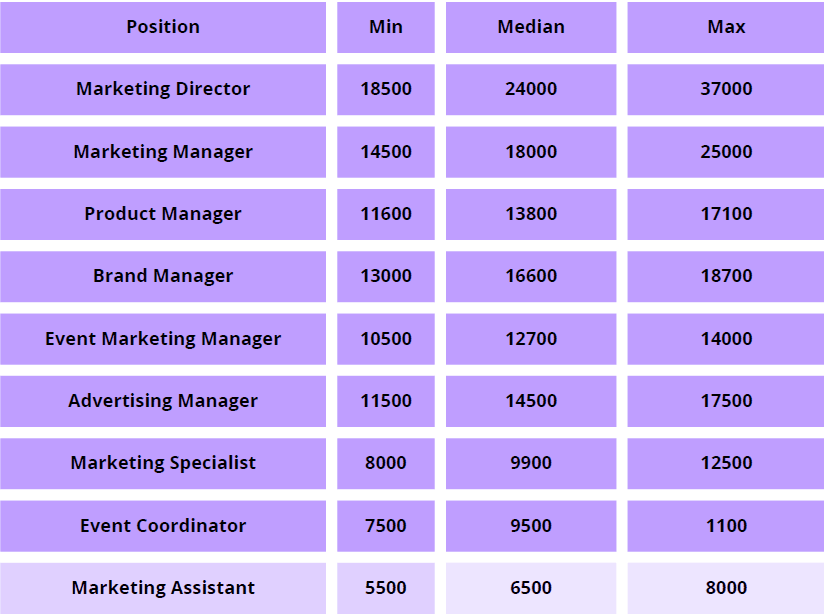
Revolutionizing Sales Roles: Trends, Technology & Growth
Sales in 2025: Salary Report Poland 2025
The sales profession in Poland continues to evolve rapidly, driven by digital transformation, automation, and changing customer expectations. According to the Salary Report Poland 2025, new technologies and compensation models are reshaping how businesses attract and retain sales talent — and this is directly influencing wages in Poland for commercial roles.Key Trends in Modern Sales Roles
Digital Sales and E-Commerce
The rise of e-commerce and social commerce has created strong demand for digital sales professionals.- Managing online stores, product listings, and customer interactions across digital platforms.
- Using SEO, analytics, and CRM tools to improve sales performance.
- Combining marketing and sales skills for omnichannel engagement.
CRM Specialists
CRM roles have become essential in retaining customers and increasing revenue per account.- Managing tools such as Salesforce, HubSpot, or Zoho CRM.
- Using customer data to create personalized sales journeys.
- Collaborating with marketing teams for lifecycle management.
Account Management
Account managers remain critical in B2B sectors including tech, finance, and manufacturing.- Maintaining long-term client relationships and customer satisfaction.
- Identifying upsell and cross-sell opportunities based on client needs.
- Adapting to diverse industries with product-specific knowledge.
Sales Compensation Structures in 2025
Base Salary with Commission
- Most sales roles include a fixed base salary, typically 60–70% of total compensation.
- Variable bonuses are tied to individual or team performance.
Individual vs. Team-Based Incentives
- Digital sales roles tend to use individual commission models.
- Team bonuses are more common in FMCG, retail, and large field sales operations.
Annual and Performance-Based Bonuses
- Companies reward annual results with year-end bonuses or recognition awards.
- High performers often receive personalized incentives, such as profit-sharing or travel perks.
Non-Monetary Incentives and Flexibility
- Stock options are increasingly offered by startups and multinational firms.
- Flexible benefits packages and career development opportunities are gaining popularity.
Sales Sector Outlook and Economic Summary
The outlook for the sales profession in Poland remains positive. As highlighted by the Salary Report Poland 2025, industry sectors with longer sales cycles or complex solutions tend to offer higher salaries in Poland and more advanced incentive models.Key insights:- B2B tech, SaaS, and consulting provide the highest average salary Poland opportunities for sales talent.
- Retail and FMCG maintain competitive yet stable Poland wages with performance-based growth potential.
- Digital literacy, CRM experience, and industry knowledge are key differentiators in 2025 compensation trends.
Salary Report Poland 2025 – Pay Scale Variance Sales Sector
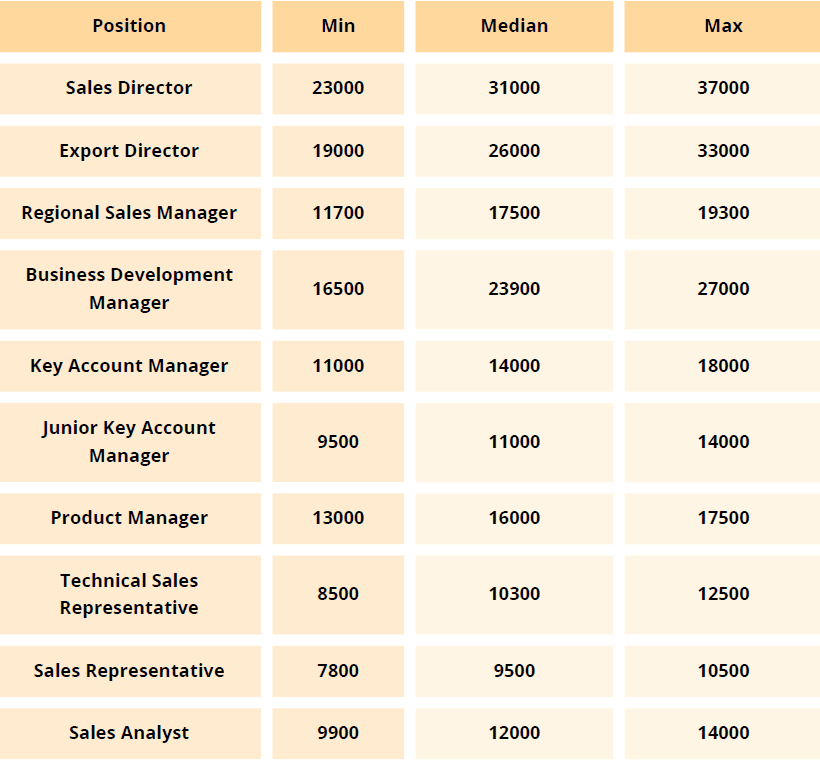
Game-Changing Pay Insights in E-Commerce – Salary Report Poland 2025
Sector Overview: E-Commerce Growth and Salary Trends in Poland
In 2025, e-commerce in Poland is undergoing rapid growth, driven by technology, shifting consumer behavior, and digital innovation. As highlighted in the Salary Report Poland 2025, this expansion is transforming the labor market and increasing wages in Poland across digital and logistics functions.Key Drivers of Growth in E-Commerce
Online Retail Expansion
Major platforms like Allegro and Amazon, as well as growing Polish startups, are fueling job creation in digital sales and operations.- Small and mid-sized businesses are investing in e-commerce storefronts and digital product catalogs.
- Specialists in SEO, product data, and payment systems integration are in high demand.
New Job Creation Across E-Commerce Functions
E-commerce growth is generating demand in marketing, IT, UX, and customer service.- Digital marketers, UX designers, and data analysts are among the most sought-after specialists.
- Customer support and content moderation roles are also expanding rapidly.
Impact on Logistics, Payments, and Security
E-commerce growth is fueling the expansion of warehousing, delivery, and payment ecosystems.- Demand is rising for fulfillment professionals, supply chain analysts, and cybersecurity specialists.
- Cooperation with fintech companies increases the need for payment system integration experts.
Regional Hubs for E-Commerce Talent
Warsaw
As Poland’s capital and innovation center, Warsaw hosts major e-commerce platforms, tech firms, and digital service providers.The Salary Report Poland 2025 shows that digital professionals in Warsaw enjoy among the highest average pay Poland benchmarks in the sector.Wrocław
A leading hub for IT development and cross-border commerce, especially with Germany. Software engineers and analytics experts are in high demand.This region’s growth is reflected in increasing Salary Poland ranges in e-commerce support roles.Kraków
Kraków’s creative and academic environment supports strong demand for UX designers, copywriters, and digital brand managers.These roles are listed among the best-paid in the Salary Report Poland 2025 within marketing and content creation.Poznań
A logistics and manufacturing powerhouse, Poznań plays a central role in fulfillment and supply chain efficiency.Wage levels in logistics-related functions in Poznań are increasing due to high demand and warehouse expansion.Tri-City (Gdańsk, Sopot, Gdynia)
The northern coastal region is a rising logistics and cross-border commerce center, linked to seaports and international shipping.The Salary Report Poland 2025 confirms above-average Poland wages in supply chain roles based in Tri-City.Sector Outlook: E-Commerce and the Polish Economy
The Salary Report Poland 2025 identifies e-commerce as one of the most dynamic and fast-growing segments of the Polish labor market. It offers a wide variety of career paths and continues to raise average salary Poland levels in digital professions.Key insights:- Digital marketing, UX, and data roles lead in compensation and hiring trends.
- Fintech partnerships and logistics innovation expand job markets beyond retail.
- Regional hubs continue to diversify job opportunities and wage levels across Poland.
Salary Report Poland 2025 – Income Bands E-Commerce
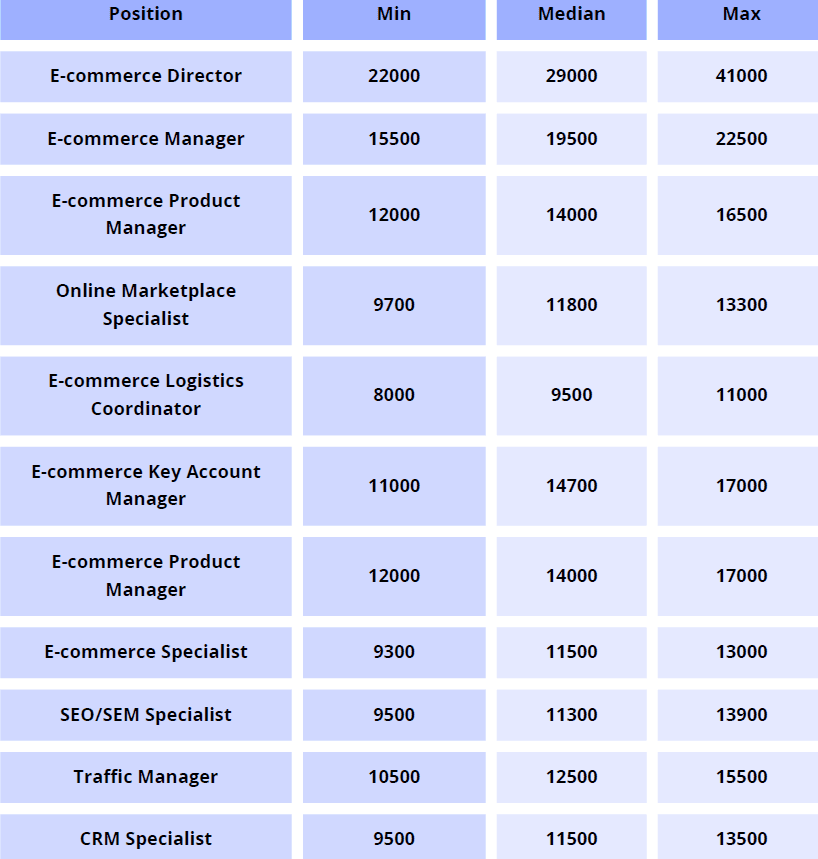
Unveiling Retail Wage Transformations – Salary Report Poland 2025
Brick-and-Mortar Retail Resurgence: Trends and Growth
According to the Salary Report Poland 2025, physical retail in Poland is regaining strength after the pandemic-era shift toward digital channels. While e-commerce remains dominant, traditional stores are focusing on customer experience, localization, and sustainability — leading to increased hiring and adjustments in retail wages in Poland.Key Trends Shaping Brick-and-Mortar Retail
In-Store Experience as a Differentiator
- Retailers are offering personalized services, interactive displays, and in-store events.
- Shopping centers are evolving into multi-purpose destinations with entertainment and dining.
Omnichannel Integration
- Retailers connect digital and physical channels through click-and-collect and flexible return policies.
- Technology enables real-time inventory and unified customer experiences.
Localized and Sustainable Retail
- Small-format stores and regional product lines are gaining popularity.
- Eco-friendly packaging, supply chains, and brand messaging appeal to conscious consumers.
Retail Workforce Trends in 2025
Part-Time and Flexible Roles
- Part-time jobs are expanding, especially in seasonal and local stores.
- Appealing to students, retirees, and those seeking supplementary income.
Flexible Scheduling Models
- Shift-swapping apps and predictive scheduling software improve workforce agility.
- Retailers are meeting employee preferences for adaptable work hours.
Gig and Temporary Work
- Retailers use gig workers for merchandising, events, and pop-up activations.
- Temporary contracts are used to scale operations during high-demand periods.
Upskilling and Employee Development
- Employees receive training in customer experience, point-of-sale systems, and omnichannel tools.
- Upskilled staff are eligible for higher-paying supervisory and specialist roles.
Sector Outlook: Retail in Poland 2025
The Polish retail industry is bouncing back in 2025, blending physical and digital strategies to meet consumer expectations. With renewed growth in local markets and innovation in customer service, the sector is again a major employer nationwide.Key insights from the Salary Report Poland 2025:- Experiential stores and hybrid shopping models drive new hiring.
- Flexible job formats attract a wide range of candidates.
- Retailers prioritizing sustainability are seeing stronger brand loyalty and talent retention.
Salary Report Poland 2025 – Wage Benchmarking Retail
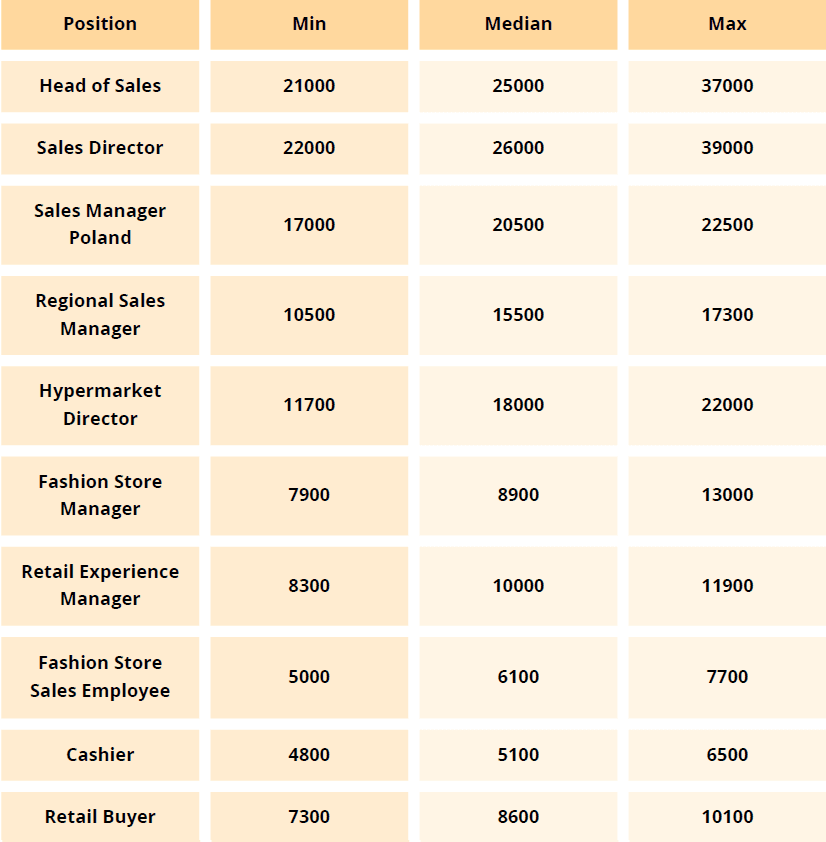
If you have any questions or need further information, please feel free to contact us. We are at your disposal and happy to assist you.
FAQ – Recruitment Poland, Recruiter Poland, Head Hunter PL
What is the average salary in Poland in 2025?
According to GUS and ZUS, the average gross monthly salary in Poland was 8,670 PLN (approx. 2,050 EUR) in May 2025.
How much is the minimum wage in Poland in 2025?
4,666 PLN/month and 30.50 PLN/hour gross.
Which industries in Poland offer the highest salaries?
IT, finance, logistics, renewable energy, and legal sectors provide the highest wages.
Are salaries in Poland increasing in 2025?
Yes, salaries have grown by 10% year-on-year.
What are typical salary brackets in Poland?
Salaries are shown as minimum, median, and maximum — based on experience and region.
How are salary benchmarks calculated?
Based on real-life recruitment projects and surveys of hiring managers.
Do salaries vary by region in Poland?
Yes — Mazovia, Silesia, and Greater Poland lead in pay levels.
Which roles are in highest demand in Poland in 2025?
Engineering, cybersecurity, logistics, renewable energy, and HR analytics.
How has remote work affected wages?
Remote work has shifted salary expectations in IT, services, and digital sectors.
Is there a gender pay gap in Poland?
Yes, although narrowing, gender gaps persist in some industries.
How do collective agreements affect salaries?
Only 17% of workers are covered — most salaries are negotiated individually.
What trends shape Poland’s labor market in 2025?
Automation, aging workforce, sustainability, and digital transformation.
What is the salary outlook for legal professionals?
ESG, IP, and compliance roles offer some of the most competitive packages.
Are engineering salaries growing in Poland?
Yes — especially in AI, infrastructure, and green energy.
How can employers use recruitment salary reports?
To benchmark offers, remain competitive, and attract top candidates.
What does a head hunter PL do for employers in Poland?
Identifies top-level talent for strategic and executive roles.
How to choose the best recruitment agency in Poland?
Look for verified track record, sector experience, and transparent communication.
What’s the difference between a recruiter Poland and an agency?
A recruiter often works individually, while agencies offer full-cycle hiring services.
Why do companies use recruitment Poland services?
To speed up hiring, reduce risk, and access well-matched local talent.
How long does recruitment in Poland usually take?
Usually 2–6 weeks, but executive roles may be faster with headhunters.